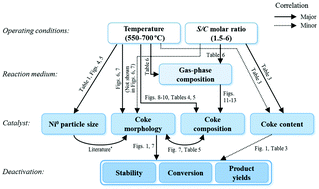Role of oxygenates and effect of operating conditions in the deactivation of a Ni supported catalyst during the steam reforming of bio-oil†
Abstract
This work investigates the correlation of the reaction conditions (temperature and steam-to-carbon ratio (S/C)) and the reaction medium composition with the deactivation behavior of a Ni/La2O3-αAl2O3 catalyst used in steam reforming of bio-oil, aiming at sustainable hydrogen production from lignocellulosic biomass. The reaction was performed in an in-line two-step system consisting of thermal treatment of bio-oil at 500 °C for retaining the thermal pyrolytic lignin and in-line steam reforming of the remaining oxygenates in a fluidized bed catalytic reactor. The reforming step was conducted at 550 and 700 °C and S/C ratios of 1.5 and 6. Fresh and deactivated catalyst samples were characterized using XRD, SEM, TEM, TPO, XPS, Raman and FTIR spectroscopy. The catalyst deactivation was mainly due to the amorphous and encapsulating coke deposition whose formation is attenuated when both the temperature and S/C ratio are increased. Although the highest catalyst stability is attained at 700 °C and/or an S/C ratio of 6, Ni sintering is noticeable under these conditions. The encapsulating coke is highly oxygenated, in contrast with the more aromatic and condensed nature of filamentous coke. Based on the correlation between the composition of the coke and the reaction medium, it was established that bio-oil oxygenates are the precursors of the encapsulating coke, particularly phenols and alcohols, whereas CO and CH4 are the possible precursors of the coke fraction made of filaments whose contribution to catalyst deactivation is hardly significant.

- This article is part of the themed collection: 2017 Green Chemistry Hot Articles


 Please wait while we load your content...
Please wait while we load your content...